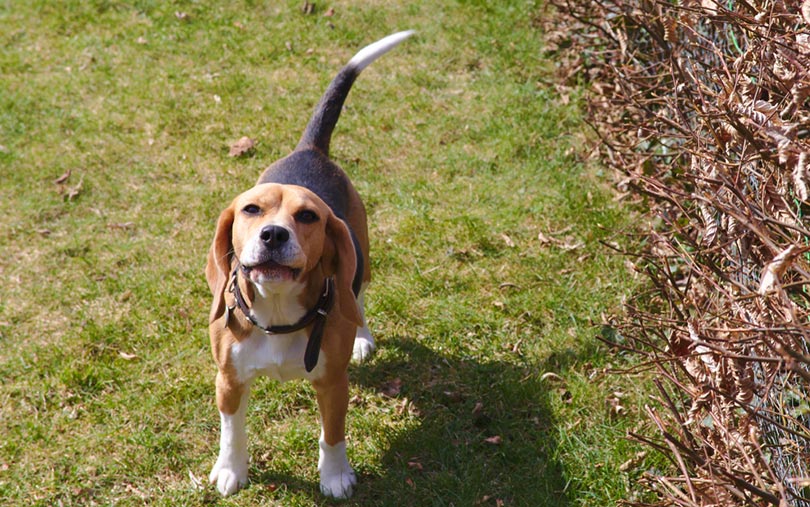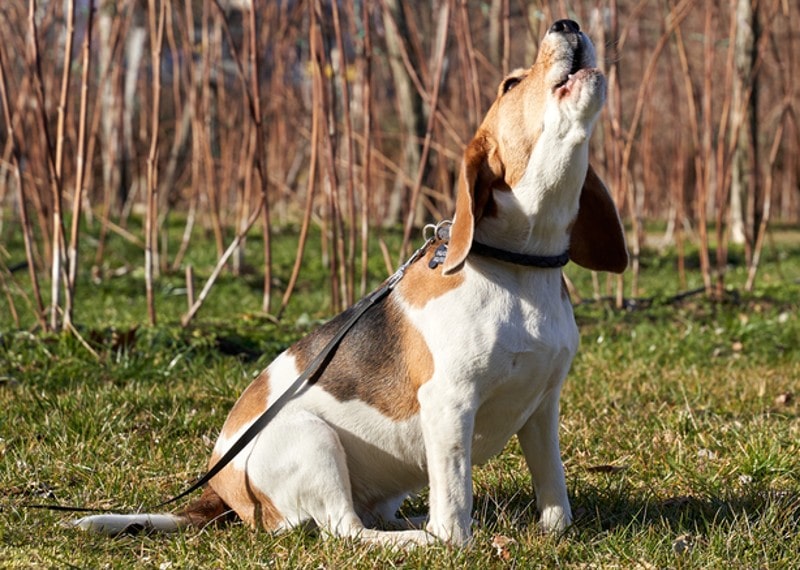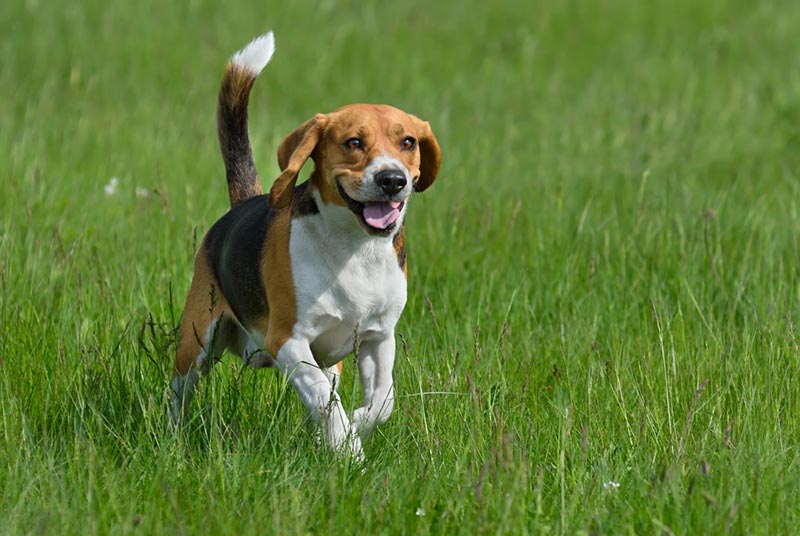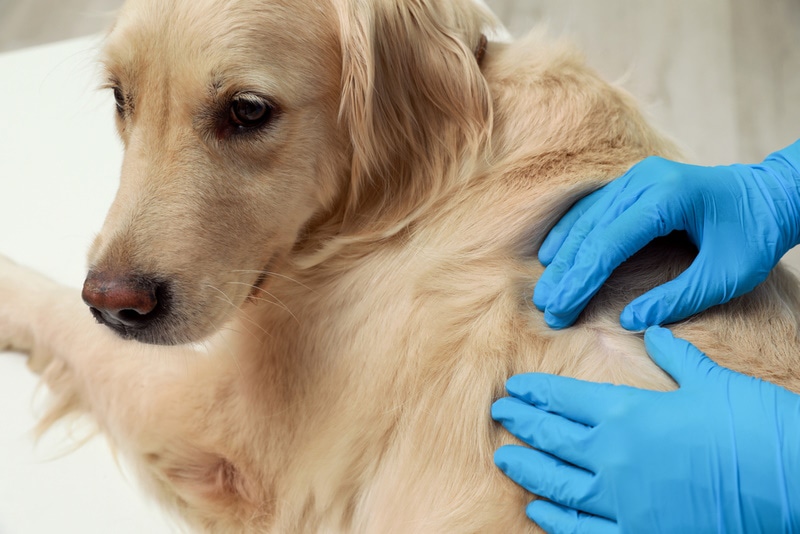Are Beagles Protective? Vet-Reviewed Temperament & Personality Traits
Updated on

Beagles were bred for tracking—not guarding. While they are pretty loud, their loudness only comes up while hunting. On a trail, they were bred to bay so that hunters and other dogs could find them. In this way, they were used to find rabbits and other animals. However, this loud baying sound rarely comes up outside hunting, especially in older dogs.
While these dogs often bark when surprised, they aren’t bred for watchdog purposes. Therefore, they do not make as good guard or watch dogs as other canines.
Furthermore, beagles do not fall into the “protective” category. They were bred to be relatively easy to handle and get along with other dogs. (Usually, many Beagles track in a pack together.) Therefore, they aren’t territorial like some other breeds. Just about everyone they meet is a friend, meaning that they will rarely see strangers as threats.
When properly socialized, Beagles aren’t protective and are pretty accepting of strangers. For families, this is a great trait, as it means that family visitors will be readily accepted by their dogs. However, it also means that they don’t typically make magnificent protection animals.
Do Beagles Protect Their Owners?
We aren’t saying that Beagles will never protect their owners. Like all animals, Beagles may be able to sense when something is wrong and respond to that threat. They are highly people-oriented, so they get very close to their humans. However, they are usually very accepting of all humans, including strangers that may be threatening.
A Beagle may bark in surprise when someone knocks on a door or enters the house. However, a Beagle isn’t likely to bite or otherwise confront the person. Instead, they’re just as likely to lick them profusely.
That said, a Beagle that isn’t correctly socialized may not be as accepting of strangers as a socialized beagle. In this case, the Beagle may bite or run from a stranger but that doesn’t mean you shouldn’t socialize your dog to encourage them to be aggressive. An unsocialized Beagle will want to confront everyone, not just those that may be threats.
This breed’s natural friendliness simply makes them a bit too friendly towards strangers to be particularly protective.
Do Beagles Guard?
As pack animals, Beagles do not have strong guarding instincts. They were bred for hunting purposes, which required getting along with many different people and other dogs. For this reason, they don’t make good guard dogs.
With that said, some Beagles may guard their food or toys. However, this is extremely unlikely and usually the result of improper socialization. Therefore, if you socialize your puppy correctly, the odds of them being protective and guarding anything are extremely low.
If you’re looking for a dog to guard your home, we recommend looking at breeds bred for this purpose. Beagles simply don’t fall into this category.
Are Beagles Good Defense Dogs?
We don’t recommend Beagles for defense for a few different reasons. Firstly, Beagles were bred to track naturally. They didn’t need training for this purpose. Therefore, trainability wasn’t very high on the list of traits Beagles needed to have. For this reason, many Beagles today are pretty independent and stubborn.
Training your Beagle to have any defensive capabilities will be difficult, if not impossible. These dogs just don’t have the trainability that other dog breeds have. German Shepherds may be able to learn all sorts of defensive training commands, but Beagles likely won’t.
Secondly, Beagles are extremely friendly. They love everyone, including strangers. Therefore, it would be easy for the violent person to disarm them. All it takes is a sweet voice and an open hand for a Beagle to fall in love with you. If you’re relying on a Beagle for protective purposes, this can be a problem.
Thirdly, Beagles are relatively small and not particularly powerful. Trying to send your Beagle into the fray is simply going to get them hurt.
Can Beagles Be Aggressive?
Just like any other dog, Beagles can be aggressive. However, they are not as disposed to this as other breeds. Instead, these dogs are usually amiable and treat everyone as friends. When compared to other dog breeds, these canines are typically far from aggressive.
That doesn’t mean that they can’t ever be aggressive. Dogs that aren’t socialized as puppies may be scared of strangers or “strange” objects and sounds. For instance, a dog that has never met a toddler may be quite fearful of one. For this reason, socialization is still important. A fearful dog can turn around and become aggressive under the right circumstances.
Beagles don’t show dominance or aggression towards other dogs in most cases. However, once again, dogs that are socialized with others may become fearful when faced with another dog. Sometimes, this may cause the Beagle to become aggressive, as they will simply be trying to defend themselves.
As with most answers in this article, Beagles are rarely aggressive, but they can be in some situations. Therefore, socialization is essential, though you don’t have to worry too much about your dog becoming aggressive in the future.
Final Thoughts
Beagles are not known as a particularly aggressive breed. Instead, this breed tends to be extremely friendly and easygoing so they aren’t the best breed for protective purposes, as they aren’t prone to be suspicious of strangers. Instead, anyone who enters the house will be their best friend.
For those looking for a guard dog, you’ll probably want to look elsewhere.
That said, there is some individual variance, mainly depending on how the dog was raised. Well-socialized dogs tend to be friendlier. Dogs who were not taken out and introduced to new sights and sounds may be more fearful than others and they are more likely to be aggressive in these circumstances.
















